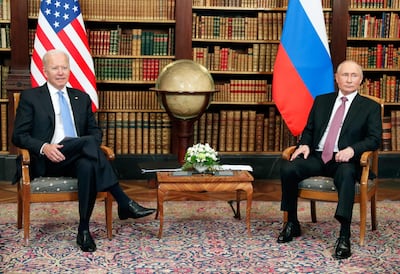A four-hour summit between US President Joe Biden and his Russian counterpart Vladimir Putin on Wednesday took place in a "constructive spirit" according to the Kremlin leader.
The summit at a Swiss lakeside villa was the final leg of Mr Biden's eight-day trip to Europe and was an effort to address the high tensions between Moscow and the West.
After the talks concluded, Mr Putin said the two sides had agreed to return US and Russian ambassadors to their posts after both diplomats were recalled earlier this year.
President Biden said the two men had discussed how to boost humanitarian aid into Syria as well as the challenges posed by Iran to the region and arms control. "The tone of the entire meeting was good, it was positive," he said.
The US leader said that America was not singling out Russia on issues such as human rights, an issue that was in the country's "DNA". He said the meeting was designed to set up a bilateral strategic dialogue to control new and dangerous weapons that are coming on the scene. He said he gave the Russians a list of 16 strategic areas that were off limits for cyber attacks.
"I told President Putin that my agenda was not against Russia," Mr Putin. "The bottom line is that I told President Putin we need to have some basic rules of the road that we can abide by.
He said the countries would hold further talks on cyber security and on strategic arms control discussions on the future of the world's two largest nuclear arsenals. A written statement confirmed Washington and Moscow would embark on an integrated bilateral Strategic Stability Dialogue that would lay the ground work for future arms control and risk reduction measures.
"There's been no hostility. On the contrary, our meeting took place in a constructive spirit," Mr Putin told a press conference.
"Both sides expressed their intentions to understand each other and to seek common ground. The talks were quite constructive."
Mr Biden came with a message that the US would stand up to cyber aggression from Moscow, after Russian operatives were repeatedly accused of meddling in US affairs.
He said he would tell Mr Putin that “if he chooses not to co-operate and acts in a way that he has in the past … then we will respond. We will respond in kind”.
The leaders got down to business in Geneva following a photo opportunity that descended into a chaotic scrum between the press pool and security forces.
Afterwards it was clear there was some progress as Mr Putin revealed officials would "would begin consultations on the full range of interaction on the diplomatic track". There was no mention by Mr Putin of talks on issues surrounding Iran, Libya or Syria.
Flanked by Mr Putin, US Secretary of State Antony Blinken and Russian Foreign Minister Sergei Lavrov, Mr Biden had opened the encounter saying it was "always better to meet face to face".
He described Mr Biden as "very different" from his predecessor, Donald Trump. "His predecessor had a different view," Mr Putin said. "This one decided to act differently. His reply was different from Trump’s."
High tensions
In April, Russia was hit with a series of sanctions in the aftermath of the SolarWinds attack on US government agencies.
Ransomware attacks were a significant topic of conversation, a senior official in Mr Biden's administration said. But the Russian leader was emphatic that the US was casting unwarranted blame on Russia.
“According to US sources the majority of cyberattacks in the world are performed from US cyberspace," he said. "The second one is Canada, then two Latin American states, and then the UK. Russia is not listed among the cyberspaces where the majority of cyberattacks come from.”
Swiss President Guy Parmelin had acted as the host for the talks, which proceeded without a break for food but were cut short from an initial three rounds to two.
Geneva was the location of a summit in 1985 between Ronald Reagan, US president at the time, and Soviet leader Mikhail Gorbachev.
Three decades after the end of the Cold War, the US and Russia still possess most of the world’s nuclear stockpile, and both have put more of their warheads into deployment.
Renewed for five years in January, New Start is the only remaining arms treaty between the two powers.
It was agreed in 2011, which was when Mr Biden last met Mr Putin, while serving as vice president under Barack Obama.
After attempting a "reset" of US-Russia relations, Mr Obama imposed sanctions on Russia over the annexation of Crimea and election interference, before leaving office in 2017.
Nato Secretary General Jens Stoltenberg said on Monday that relations with Russia were at their lowest point since the Cold War.
The EU’s foreign affairs chief Josep Borrell said on Wednesday that the prospect of better relations between Europe and Russia appeared more distant that ever.
"We believe that a renewed partnership, allowing us to realise the full potential of a close co-operation with Russia, is a distant prospect.
"The EU, therefore, needs to be realistic and prepare for a further downturn of our relations with Russia."
Mr Borrell was presenting a report that outlined how the EU could better manage relations with Russia.
The document said that “the potential for EU-Russia co-operation is considerable”.
“However, the Russian government is actively pursuing objectives that go in the opposite direction,” it added.






















